Centre for Governance and Inclusive Society
The Centre for Governance and Inclusive Society (CGIS) examines emerging policy questions confronting policymakers with evidence and knowledge to build inclusive society and responsive governance in a rapidly changing context. The centre analyses current and contemporary policy processes and challenges related to civic engagement, local governance, decentralization, youth, leadership and new technologies. Our research also incorporates cross-cutting topics on climate change, technology and gender. In terms of gender, we focus on: (i) the participation of women in institutions as decision-makers and public officials at the national and sub-national levels; (ii) the engagement of women as citizens with the government and its institutions and mediators; (iii) the capacity of the state to promote gender equality, and to mainstream gender within institutions, including through policy, programmes and budget arrangements; and (iv) the impact of the political and technological development on gender relations more broadly, including whether state responses enable or constrain gender equality.The research draws critically from the literature to formulate theoretically informed, policy-relevant research questions that would uncover, interrogate and explain Khmer conceptions and perspectives of key governance and emerging trends, thereby laying the groundwork for an indigenous Cambodian social science. In the current Research Strategy 2016-2021, the CGIS’s main research titles Ponlork: The Emergence of a New Era for Cambodia. Ponlork focuses on the impact of demographic change on politics and society in Cambodia.
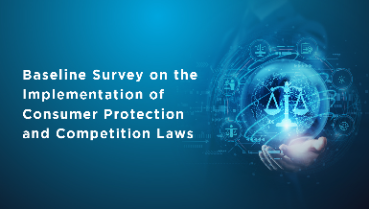
Baseline Survey on the Implementation of Consumer Protection and Competition Laws
With the Law on Consumer Protection enacted in 2019 and the Law on Competition in 2021, Cambodia has established the legal architecture for a fairer market and solidified the rights of consumers alongside the obligations of busine...

Study on Representation, Accountability, and Governance at the Subnational Administration Level in Cambodia
CDRI research on decentralization and local governance reform showed that over the last 20 years, elected commune/sangkat councils have become among the most trusted and respected government institutions across Cambodia. Charged w...
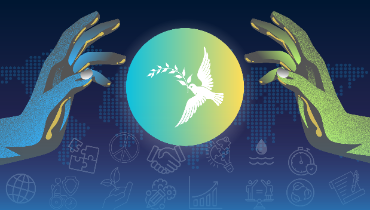
Understanding Long-term Peacebuilding: Lessons from Cambodia and Mozambique
The context in which peacebuilding occurs has experienced a dramatic shift during the last two decades. Following the end of the cold war – which were formative years for the industry – civil wars/conflicts typically ended with a...
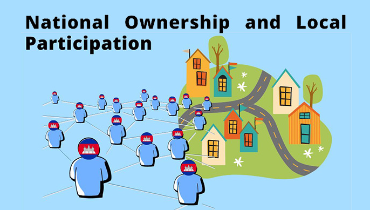
National Ownership and Local Participation
University of GothenburgThis research project investigates the inter-relation between national ownership and local participation. The working hypothesis is that these two concepts cannot and should not be conflated as often is the case in the development...
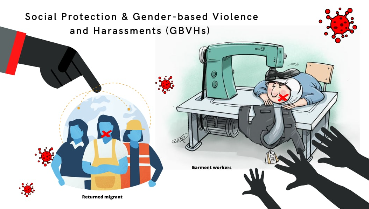
Impacts of COVID-19 on Returned Migrants and Garment Workers: Gender-based Violence and Harassment (GBVH) and Social Pro...
Solidarity CenterGlobally, the COVID-19 pandemic increased gender-based violence and harassment in the world of work. Even prior to the pandemic, in the garment sector, garment workers, particularly women garment workers, often experienced: forced...
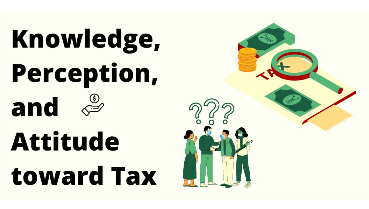
Culture of Paying Tax: Knowledge, Perception, and Attitude Toward Tax
Indikator InstituteCambodia is a developing country where tax revenue is the fundamental source for government revenues. Tax receipts account for about 67.45 percent of total government income (Ministry of Economy and Finance, 2016). The Ministry of...
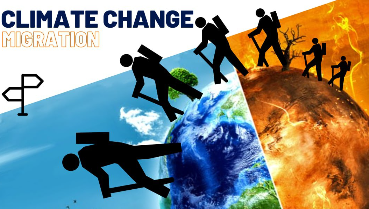
Climate Change and Migration: Evidence from Mekong Lowland Cambodia
The Economy and Environment Partnership for Southeast AsiaEfforts to address climate change, migration, and security are contextualized by the inclusion of migration concerns in the negotiation and policy processes under the United Nations Framework Convention on Climate Change (UNFCCC)....
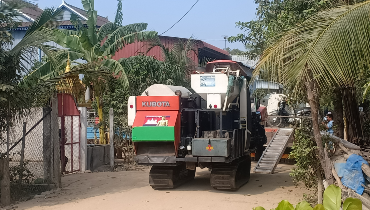
The Financialization of Agrarian Landscapes in Cambodia
National University of SingaporeFinancial markets have recently transformed agrarian landscapes throughout Southeast Asia. Smallholder farmers have gained access to formal financial technologies—such as microcredit, insurance, and mobile banking—to capitalize ag...
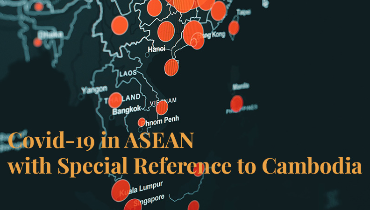
Covid-19 in ASEAN with Special Reference to Cambodia
Overseas Development InstituteCambodia has so far had limited direct experience of the pandemic, however, indirect effects have been several – disruption of migration, investment, tourism, garments and regional agricultural and other exports. In 2021 there hav...
There is no data list!
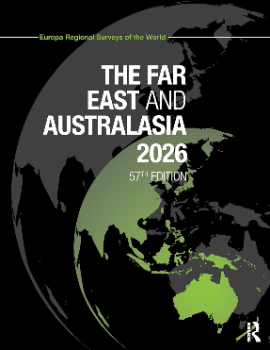
Aid and Development in South-East Asia
Southeast Asia exhibits varied developmental progress, meaning Official Development Finance (ODF) remains essential for closing key infrastructure and development gaps.The focus of development aid has evolved from its historical geopolitical origins to a modern emphasis on poverty reduction, governance, and inclusive economic growth.Today's development finance landscape is a complex mix of traditi...
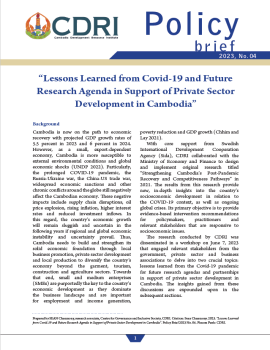
Lesson Learned from Covid-19 and Future Research Agenda in Support of Private Sector Development in Cambodia
Cambodia is now on the path to economic recovery with projected GDP growth rates of 5.5 percent in 2023 and 6 percent in 2024. However, as a small, export-dependent economy, Cambodia is more susceptible to external environmental conditions and global economic shocks (UNDP 2022). Particularly, the prolonged COVID-19 pandemic, the Russia-Ukraine war, the China-US trade war, widespread economic sanct...
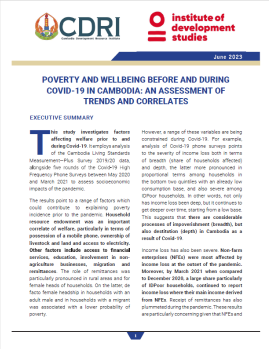
Poverty and Wellbeing Before and During Covid-19 in Cambodia: An Assessment of Trends and Correlates
This study investigates factors affecting welfare prior to and during Covid-19. It employs analysis of the Cambodia Living Standards Measurement—Plus Survey 2019/20 data, Frequency Phone Surveys between May 2020 and March 2021 to assess socioeconomic impacts of the pandemic. The results point to a range of factors which could contribute to explaining poverty incidence prior to the pandemic. Hou...
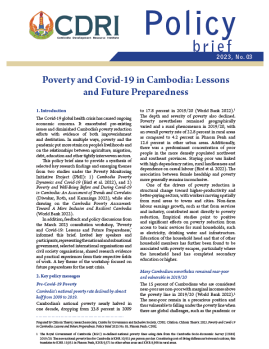
Poverty and Covid-19 in Cambodia: Lessons and Future Preparedness
The Covid-19 global health crisis has caused ongoing economic concerns. It exacerbated pre-existing issues and diminished Cambodia’s poverty reduction efforts with evidence of both impoverishment and destitution. In multiple ways, poverty and the pandemic put more strain on people’s livelihoods and on the relationships between agriculture, migration, debt, education and other tightly interwoven se...
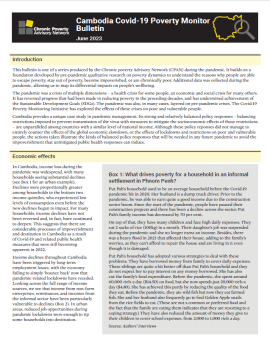
Cambodia Covid-19 Poverty Monitor Bulletin
This bulletin is one of a series produced by the Chronic poverty Advisory Network (CPAN) during the pandemic. It builds on a foundation developed by pre-pandemic qualitative research on poverty dynamics to understand the reasons why people are able to escape poverty, stay out of poverty, become impoverished, or are chronically poor. Additional data was collected during the pandemic, allowing us...
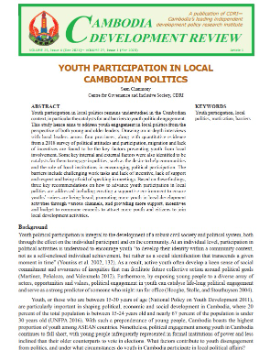
Youth Participation in Local Cambodian Politics
Youth participation in local politics remains understudied in the Cambodian context, in particular the catalysts for and barriers to youth political engagement. This study hence aims to address youth engagement in local politics from the perspective of both young and older leaders. Drawing on in-depth interviews with local leaders across four provinces, along with quantitative evidence from a 2018...
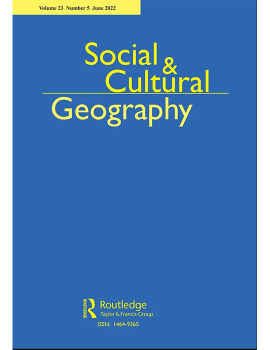
'Worn Out’: Hunger, Debt Discipline, and the Gendered Contingencies of the COVID-19 Pandemic Amongst Cambodian Garment Workers
Drawing on 203 quantitative surveys with women workers in Cambodia and a further set of semi-structured interviews with 60 original participants, this paper is one of the very first to present empirically grounded research from garment workers on the financial challenges of navigating the first year of the COVID-19 pandemic. We show how in the making of clothes to be worn by Western consumers, poo...
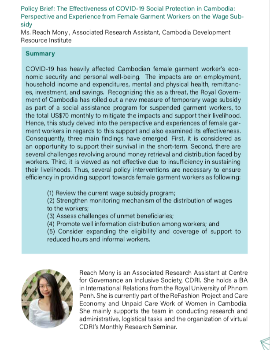
The Effectiveness of COVID-19 Social Protection in Cambodia: Perspective and Experience from Female Garment Workers on the Wage Subsidy
COVID-19 has heavily affected Cambodian female garment workers’ economic security and personal well-being. The impacts are on employment, household income and expenditures, mental and physical health, remittances, investment, and savings. Recognizing this as a threat, the Royal Government of Cambodia has rolled out a new measure of temporary wage subsidy as part of a social assistance program for...
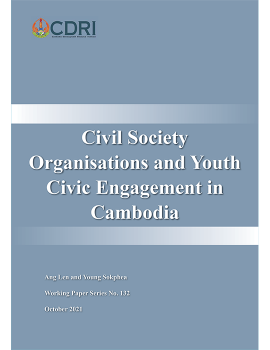
Civil Society Organisations and Youth Civic Engagement in Cambodia
This working paper explores the evolving role of civil society organisations (CSOs) in promoting youth civic engagement in Cambodia amid shifting political dynamics following the 2013 national election. Drawing on qualitative data from three provinces and Phnom Penh, the study examines the strategies of three distinct organisations—an internationally funded NGO (A), an independent NGO (B), and a s...
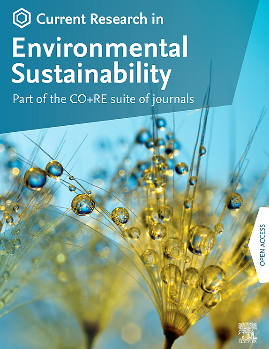
Do Climate Uncertainties Trigger Farmers’ Out-migration in the Lower Mekong Region?
Many rural communities in the Lower Mekong region are vulnerable to the climate uncertainty induced by climate change due to high rate of poverty, lack of agricultural technology, and heavy reliance on the environment for their livelihoods. Rural people are likely to migrate to urban areas in response to the climate impacts and thanks to the rises in the number of cities, urban areas, and industri...

Consultation Workshop on The State of Local Governance in Cambodia: Accountability, Representation, and Responsiveness
On 1st August 2024, CDRI’s Centre of Governance and Inclusive Society successfully organised the consultation workshop on The State of Local Governance in Cambodia: Accountability, Representation, and Responsiveness at Raffles Hotel Le Royal. This workshop brought together around 80 representatives from government institutions, subnational administration, civil society organisations, local communities, and development partners to share and discu...
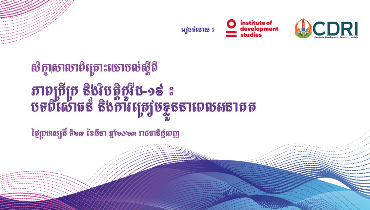
23 Mar
Consultative Workshop
Consultative Workshop on Poverty and Covid-19: Lessons and Future Preparedness
Raffles Hotel Le Royal
On 23 March 2023, CDRI's Centre for Governance and Inclusive Society organised a consultative workshop on Poverty and COVID-19: Lessons and Future Preparedness to share preliminary findings on Cambodia's poverty, lessons on COVID-19's impacts and coping strategies, and key recommendations for future crisis preparedness with national and sub-national administrations and stakeholders from civil society organisations. Besides sharing the findings, w...
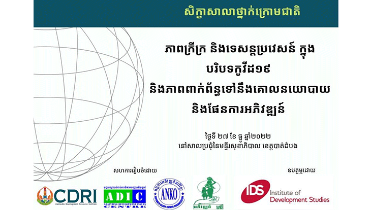
27 Dec
Dissemination Workshop
Poverty and Migration in the Context of Covid-19 and its Implication on Development Policies and Planning
08:00 AM - 04:15 PM
Regional Training Centre, Provincial Department of Health, Battambang Province
CDRI, in collaboration with ADIC, is organising a sub-national workshop with support from Institute of Development Studies. This workshop aims to promote research culture and practices among sub-national planners, so they will incorporate research into sub-national development planning and become aware of poverty trajectories and trends, particularly in the context of a rapidly changing world and increasing risks. The main objectives of the...
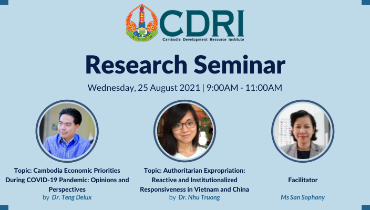
25 Aug
Monthly Research Seminar
Cambodia Economic Priorities During COVID-19 Pandemic: Opinions and Perspectives
09:00 AM - 11:00 AM
CDRI is hosting our virtual monthly research seminar on Wednesday, August 25, 2021 from 9:00AM - 11:00AM (Phnom Penh time) via Zoom. Two speakers will give presentations on the following topics: Cambodia Economic Priorities During COVID-19 Pandemic: Opinions and Perspectives, by Dr. Teng Delux Authoritarian Expropriation: Reactive and Institutionalized Responsiveness in Vietnam and China, by Dr. Nhu Truong Please kindly access this link or...
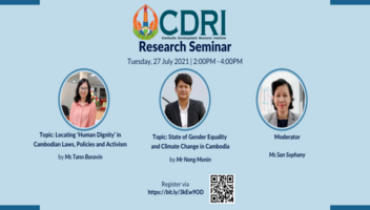
27 Jul
Monthly Research Seminar
Locating ‘Human Dignity’ in Cambodian Laws, Policies and Activism and State of Gender Equality and Climate Change in Cambodia
03:00 PM - 04:30 PM
Zoom
CDRI is hosting our virtual monthly research seminar on Tuesday, 27 July 2021 from 2:00 PM - 4:00 PM (Phnom Penh time) via Zoom. Two speakers will give presentations on the following topics:Locating ‘Human Dignity in Cambodian Laws, Policies and Activism, by Ms Tann BoravinState of Gender Equality and Climate Change in Cambodia, by Mr Nong MoninPlease access this link for your registration:
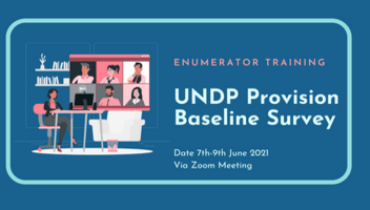
07 Jul
Enumerator training
Enumerator Training of UNDP Provision Baseline Survey
Virtual
CDRI organized a four-day training to enumerators to deliver data collection for the project which has the objective of promoting democratic governance initiatives and a peaceful, inclusive, and equitable society through expanding opportunities for inclusive civic engagement using existing infrastructure. The enumerators were enhanced knowledge and understanding the requirements of the survey, structured questionnaires in hard copy and CSpro (onl...
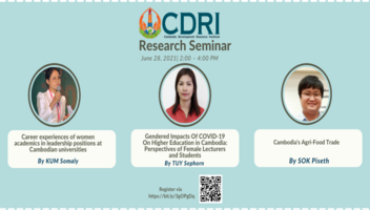
28 Jun
Monthly Research Seminar
"Career experiences of women academics in leadership positions at Cambodian universities"; "Gendered Impacts Of COVID-19 On Higher Education in Cambodia: Perspectives of Female Lecturers and Students"; "Cambodia's Agri-Food Trade"
02:00 PM - 04:00 PM
Zoom
CDRI is hosting our virtual monthly research seminar on Monday, June 28, 2021 from 2:00PM - 4:00PM (Phnom Penh time) via Zoom. Three speakers will give presentations on the following topics: "Career experiences of women academics in leadership positions at Cambodian universities" by Ms KUM Somaly."Gendered Impacts Of COVID-19 On Higher Education in Cambodia: Perspectives of Female Lecturers and Students" by Ms TUY Sophorn."Cambodia's Agri-Food T...
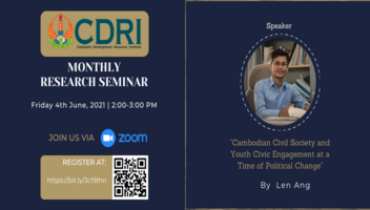
04 Jun
Monthly Research Seminar
"Cambodian Civil Society and Youth Civic Engagement at a Time of Political Change"
02:00 PM - 03:00 PM
Zoom
CDRI is hosting our virtual Monthly Research Seminar under the topic "Cambodian Civil Society and Youth Civic Engagement at a Time of Political Change" by Len Ang on Friday, June 4, 2021, from 2:00-3:00 PM (Phnom Penh time) via Zoom.
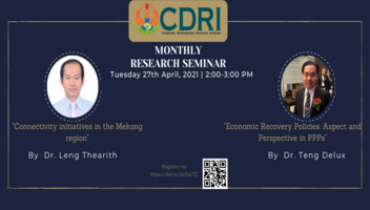
27 Apr
Monthly Research Seminar
"Connectivity initiatives in the Mekong region"; "Economic Recovery Policies: Aspect and Perspective in PPPs"
02:00 PM - 03:30 PM
Zoom
CDRI is hosting our virtual monthly research seminar on Tuesday, April 27, 2021, at 2:00 -3:30 PM (Phnom Penh time) via Zoom. By topic: Connectivity initiatives in the Mekong region by Dr Thearith Leng Economic Recovery Policies: Aspect and Perspective in PPPs by Dr Teng Delux
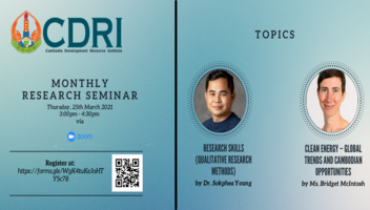
25 Mar
Monthly Research Seminar
“Research Skills (Qualitative Methods)” and “Clean Energy – Global Trends and Cambodian Opportunities”
03:00 PM - 04:30 PM
Zoom
CDRI is hosting our virtual monthly research seminar on Thursday, March 25, 2021, at 3:00 -4:30PM (Phnom Penh time) via Zoom. By topic: Research Skills (qualitative methods), by Dr Sokphea YoungClean Energy – Global Trends and Cambodian Opportunities, by Mrs Bridget McIntosh
